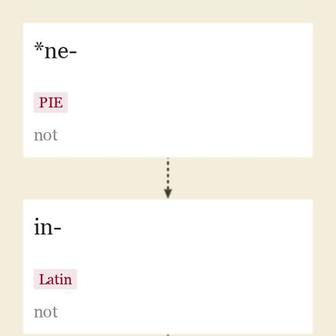inexpedient (adj.)
"不适合于目的或情况",大约1600年,来自 in-(1)"不,相反的" + expedient。相关词汇: Inexpedience; inexpediently。
最早记录年份: c. 1600
inexpedient 的相关词汇
expedient (adj.)
14世纪晚期,“有利的,适合的,适合某种目的”,源自14世纪的古法语 expedient “有用的,有益的”,或直接源自拉丁语 expedientem(主格 expediens)“有益的”, expedire “使适合或准备好,准备”(见 expedite)。名词“在紧急情况下采用的设备,有助于实现所需结果”的含义始于1650年代。相关: Expediential; expedientially(均为19世纪)。
Expedient, contrivance, and device indicate artificial means of escape from difficulty or embarrassment; resource indicates natural means or something possessed; resort and shift may indicate either. [Century Dictionary]
Expedient, contrivance 和 device 表示人为摆脱困难或尴尬的人工手段; resource 表示自然手段或拥有的东西; resort 和 shift 可能表示任何一种。[世纪词典]
in- (1)

这个词缀的意思是“不,相反,没有”(也可以是通过与后面的辅音音节化的 -n- 的同化而来的 im-, il-, ir-,这种趋势始于后期拉丁语),源自拉丁语 in- “不”,与希腊语 an-,古英语 un- 同源,均来自 PIE 词根 *ne- “不”。
在古法语和中古英语中,通常使用 en-,但大多数这些形式在现代英语中已经不再使用,只有极少数(例如 enemy)不再被视为否定的。在英语中的经验法则是,对于明显的拉丁语元素使用 in-,对于本土或本土化的元素使用 un-。
inexpediency (n.)
1640年代; 见 inexpedient + 抽象名词后缀 -cy。